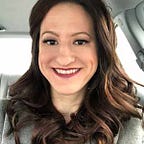What Happens to Your Savings When You Get More Money?
I save 50 percent and spend the rest.
When I got off the phone after being told that an unexpected $11,000 was coming my way, I burst into tears.
I had just moved from New York to Chicago, and I spent most of my savings on moving trucks and security deposits. Then my cat got sick and vet bills started coming in. I was not broke, but the Fuck Off Fund I had imagined when I moved to a cheaper city was dwindling quickly, and my credit card balance was rising.
Then I got that phone call.
The relief I felt was visceral. I was no longer drowning; I was floating. After you’ve scrimped and saved and waited and budgeted, an influx of cash can feel like a literal dream.
The hardest part of saving money for me is that I have to do it by not doing things. Not eating out, not shopping, not spending. I’m a doer — I like lists and I like planning — and it kills me that the best way to achieve my financial goals is to sit and wait.
That’s partly why it feels so good to get more money — it feels like I finally did something to produce visible, immediate results that will help my savings account grow. When that happens — either in the form of a raise or one large influx of cash — it can feel like all my money problems are over. But unless I’m careful with how I spend and save it, I’ll end up right back where I started: scrimping and saving and waiting and budgeting.
When I am focusing on saving money, I tend to put things off. I don’t replace my dying computer, and I wait to get new jeans when a hole pops up in the ones I have. When I put things off for long enough, it becomes very tempting to try to replace everything the second I have money again. But if I try to do it all at once, that money will disappear quicker than it showed up in the first place.
There’s a an episode of Gaby Dunn’s “Bad With Money” podcast that deals with this exact financial mindset. (Are you listening to “Bad With Money?” I really love it!)
In “Gaby Gets Her Head Examined (aka Plan Bay),” financial psychologist Dr. Brad Klontz explains that “Rich Person Thinking” leads people to hold on to money because they believe that money can generate future income. “Poor Person Thinking” leads people to spend all their money because they’ll get an immediate reward. When you’re used to not having enough money, you want to spend the money you do have as fast as you can before it gets turned into something you can’t keep, like an insurance premium hike.
I didn’t want to spend my entire $11,000, and I wanted to think like a rich person—or at least a smart person, so I turned to one of the smartest people I knew: my dad. (Hi, dad!) My dad’s #1 money rule is if you get a bump, put it into savings. His #2 money rule is to max out any 401(k) contributions that your company matches — it’s free money!
More specifically, Dad recommends that if you get a raise, automatically invest 50 percent of the difference between your old salary and your new, and then live on the rest. Same for bonuses or other windfalls: save 50 percent, spend the rest. Essentially, this allows you to treat yourself while still increasing your savings — and I think this is the key reason it works. I’m only human, after all; if I get more money, I want to spend at least some of it on something for myself. This tactic sort of splits the difference between poor thinking and wealthy thinking, allowing you to get some immediate reward while saving the rest.
When I got my unexpected $11,000, the first thing I did was pay off my credit card bill. The next thing I did was replace an old, dying laptop. It felt good to be able to take care of myself financially and set myself up for a better future, and a brand new fancy laptop definitely felt like a treat. But before I could replace all the things in my life that needed replacing (shoes, old sweaters, some grody pots and pans), I put the rest into my savings account and felt my Fuck Off Fund get a little more secure.
Rae Nudson is a freelance writer and editor. She is currently trying to talk herself out of going shopping for new clothes. You can find her on Twitter @rclnudson.
This week, we’re celebrating the Fuck Off Fund. This story is part of this series.
